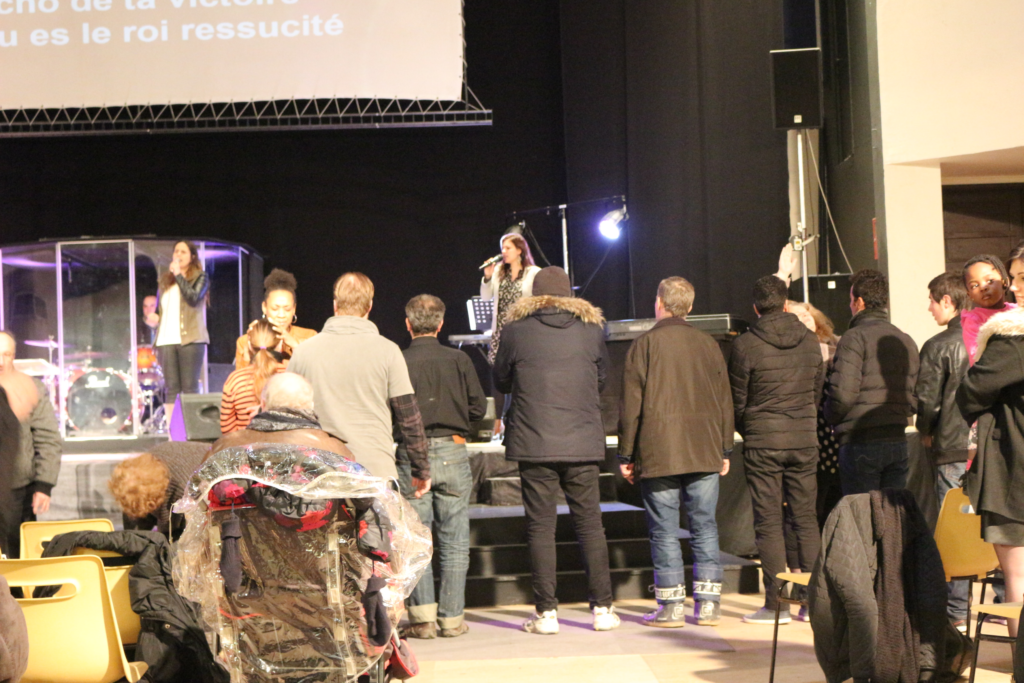
Reaching out to the migrants who arrive in the north of France presents the Church with a weighty dilemma. The migrants have generally paid smugglers several thousand pounds to help them to cross Europe, and have their eyes – and their hearts – set on reaching England, which will mean putting more money in the hands of smugglers, who operate in criminal gangs. It will also mean entering the UK illegally, potentially endangering or implicating the lorry driver whose load they will usually infiltrate, and causing material (and perhaps psychological) damage.
Pastor Lydie Granger, whose church in Dunkirk, Dk Live, offers migrants material and spiritual support, told World Watch Monitor: “We give them food, clothes, shoes, anything they need. And [we] pray for them, for God’s favour and protection.
“We don’t help them to go illegally, but we pray God’s favour on them. I’m not saying God’s favour is to help them to go illegally, but they are in such a situation that personally I’m not looking at that [aspect].”
She said it was important to remember the hardship the migrants had fled from. “As I was praying one day I was asking God, ‘What is the solution?'” she said. “Something needs to change in England for them to go, or to change in France. The Lord reminded me of the situation with Moses and the people of Israel running out of Egypt to go to their Promised Land. They were being followed by the Egyptians and their lives were in danger. And I had this picture of them coming by the Red Sea and it needed a miracle. Nobody asked if it was legal or illegal to open the Red Sea.”
She continued: “We say, ‘We are happy to welcome you and help you stay in France,’ but [England’s] where they want to go; in their minds it’s like their Promised Land.”
Mrs Granger said that at a recent meeting of local clergy, one man said he prayed the migrants would decide to stay in France because he could not cope with the idea of them going illegally. “And I understand,” she added.
One of the church’s volunteers believes the French authorities could do far more to encourage the migrants to apply for asylum locally. Laila Mohamed, who is half-Yemeni and speaks fluent Arabic, said migrants prefer England to France because they are more likely to know some English than any French.
But she added: “If there was a prospectus, a leaflet, on what France would do for them – education, work, health, encouragement, school, formation – they would stay … The picture migrants have today of France is negative because some have been beaten by police, some have been sworn at while doing nothing wrong.”
She is highly critical of efforts by Calais Mayor Natacha Bouchart to ban food distributions and the offering of showers to migrants.
“Are we going to leave a dog in the street?” Ms Mohamed asks. “We’re not. And today, in France, they are forbidding us from feeding the migrants in the street. So where are the human rights in this?”
One of the migrants Laila has befriended, Sara, 43, said she wished there were legal ways for her to reach England. She fled Iran after becoming a Christian and being told the secret police were arresting members of her underground church.
“I wish it wasn’t illegal, but it is impossible. I would like it to be legal; it would be better and safe,” she said.
Mrs Granger said some people have suggested the church cease its outreach, telling her it does not help the situation, because the migrants are still coming.
But she said: “They’ll still come; that’s not the point.” Instead, she said she has had to say to her church, “Times have changed, and whether we want it or not, we will have to face that.”
Those changes are not just the establishment of the well-worn path from Middle Eastern warzones to rural northern France. Mrs Granger said economic migrants are arriving from further afield – Egypt and Eritrea – and climate-change is expected to begin producing yet more refugees. “People say it’s not going to get better,” she added.
When migrants began attending services, the church initially carried out bag checks to help the congregation feel safe. Mrs Granger said they felt further reassured when they saw migrants becoming Christians and being baptised. Mrs Granger said she accepts that some migrants may attend church – and even get baptised – to enhance their application for asylum. And that she wonders what the migrants understand in church if there is no French-to-Farsi interpreter on the day. One worship song during the Sunday service is sung in Farsi, to the delight of the migrants there. The church runs weekly Farsi Bible studies and offers newcomers Bibles in Farsi and Arabic.
She said that one migrant the church recently baptised told her: “Thank you … before I was always stressed, my mind was like darkness.”
“The Holy Spirit is doing his work,” Mrs Granger added.
Ms Mohamed, who runs the church’s outreach to migrants and converted from Islam 20 years ago, is categorical: “A lot of those who come to church are Muslim. We are not entitled to close the door. It is not our house; it’s God’s house. So as it is the Father’s House, you have to let whoever wants to enter, enter.”